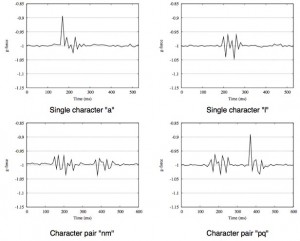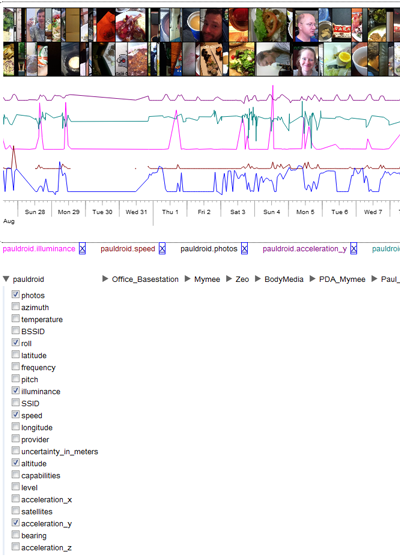 (http://quantdoctor NULL.com/wp-content/uploads/2011/10/smartphone_vibrations NULL.jpg)
(http://quantdoctor NULL.com/wp-content/uploads/2011/10/smartphone_vibrations NULL.jpg)Tracking Keystrokes with Smartphone Accelerometry. Georgia Tech.
An article in Technology Review discussed data from a Georgia Tech research group suggesting that smartphone accelerometers are now good enough to detect the keys pressed as you enter your password, based on which side of the phone they’re on and the delay between keystrokes. The article also notes that the GPS, microphone, and other sensors could be used in a compromised phone to monitor its owner nefariously.
True.
But I think an equally interesting point is that smartphone owners are carrying around a passive self-tracking device and could easily be streaming that data to their own private database, collecting a treasure trove of information about their life activities and environment that could be used for greater personal insight and to conduct self-tracking experiments.
The BodyTrack (http://bodytrack NULL.org) Android app can currently stream data from all sensors on a phone to my personal datastore. These channels include
- Ambient temperature
- Ambient light (illuminance)
- Location: Latititude/longitude/altitude and GPS uncertainty
- Orientation: Azimuth/bearing/pitch/roll
- Acceleration X, Y, and Z
And some active data entry can easily be added, such as comments, photos and other variables a la Mymee App (http://mymee NULL.com).
 (http://quantdoctor NULL.com/wp-content/uploads/2011/10/android_data21 NULL.png)
(http://quantdoctor NULL.com/wp-content/uploads/2011/10/android_data21 NULL.png)Data Streaming from Android
Depending on the rate of data capture, data streaming can result in a significant battery drain. But some phones seem to do better with that than others, and having streamed data for quite some time on a Droid 2, it was definitely manageable. I did carry a backup battery pack (http://www NULL.amazon NULL.com/New-Trent-iDual-Port-IMP50D-Blackberry/dp/B003690Q42/ref=pd_cp_cps_1/191-9731307-1131906) for my phone just in case.
link to article in Technology Review (http://www NULL.technologyreview NULL.com/computing/38913/?p1=A3)
The key to making this streaming capability a force of good, and not evil, is creating open-source data platforms where users can securely and privately control their own data.
And don’t leave your phone lying around where someone can install malware.

